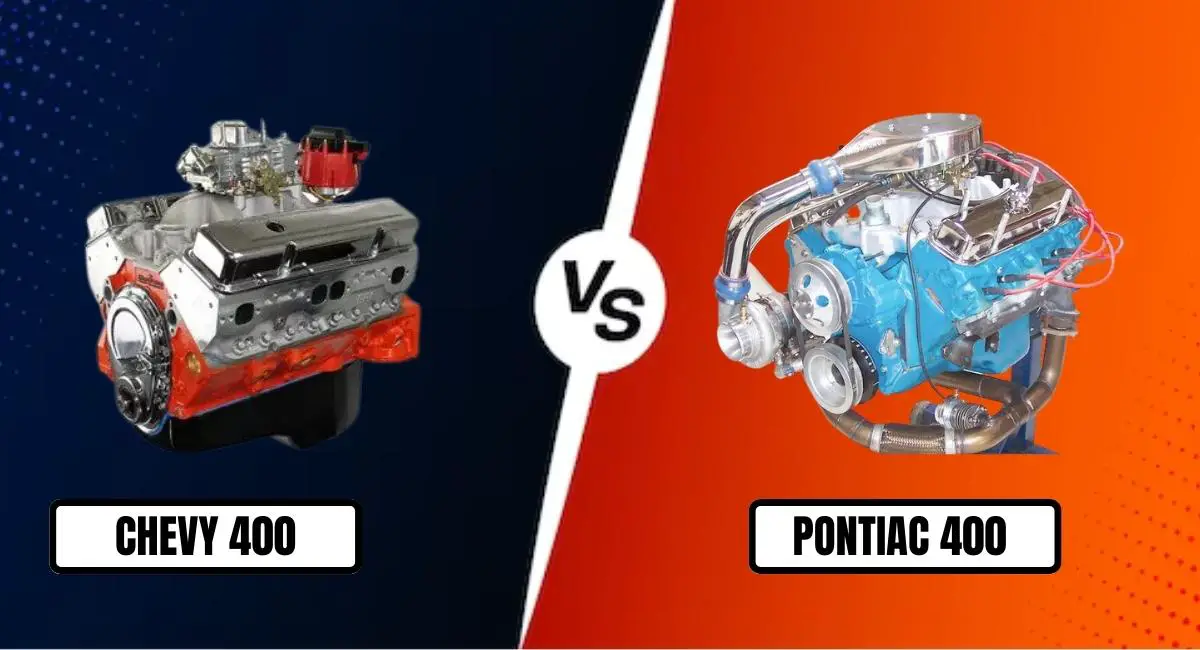In the world of classic muscle cars, the power and performance of an engine often stand as defining characteristics. The essence of these magnificent machines lies beneath their hoods, where roaring beasts await to unleash raw power onto the open road.
Two such iconic engines, which have captured the hearts of automotive enthusiasts worldwide, are the Pontiac 400 and Chevy 400. Each of these powerhouses, engineered by giants of the American automotive industry, left an indelible mark on the history of muscle cars.
For some, the smooth, raw power of the Pontiac 400 is irresistible. For others, the reliable performance and longevity of the Chevy 400 make it a clear winner. But is it that simple?
This article aims to provide a detailed comparison of these two iconic engines – the Pontiac 400 and the Chevy 400.
Understanding the Pontiac 400
When it comes to classic American muscle, Pontiac has a strong legacy. Below is a discussion on the Pontiac 400 features, history, and pros and cons to help you understand this muscle car engine.
History and Development of the Pontiac 400 Engine
The introduction of the Pontiac 400 engine was during the golden age of muscle cars in the late 1960s. It quickly became popular due to its significant power upgrade from its predecessors and its ability to add substantial performance to any vehicle installation. As a brainchild of the Pontiac Motor Division of General Motors, this engine held its own against other muscle car engines of the time.
Pontiac 400 Engine Specs
The Pontiac 400 is a 400-cubic-inch (6.6 L) V8 engine that brought a lot of power to the table. Depending on the variant, it provided a power output ranging from 265 to 370 horsepower. When it comes to torque, this engine could deliver up to 475 lb-ft, making it one of the most potent engines in its class during its era.
Notable Models Using the Pontiac 400
The Pontiac 400 engine powers several notable Pontiac models. For instance, it powers iconic vehicles such as the Pontiac GTO, Firebird, and Bonneville. These models were known for their remarkable performance and are the best in classic cars.
Strengths and Weaknesses of the Pontiac 400 Engine
The Pontiac 400 engine has many strengths and some weaknesses. Find them below.
Strengths of the Pontiac 400 Engine
Power Output: The Pontiac 400 offers impressive horsepower and torque, especially for its era. This substantial power output allows for exhilarating performance and a satisfying driving experience.
Versatility: Another strength of the Pontiac 400 is its versatility. The engine can be easily tuned or modified to cater to individual preferences or specific performance requirements.
Iconic Status: This engine has powered some of the most renowned and admired Pontiac models, including the GTO, Firebird, and Bonneville. Its association with these iconic cars adds to its charm and desirability.
Sound: The distinct, throaty growl of the Pontiac 400 engine is a delight for muscle car enthusiasts. This powerful rumble, typical of classic American engines, significantly enhances the overall driving experience.
Weaknesses of the Pontiac 400 Engine
Fuel Consumption: Despite its many strengths, the Pontiac 400 is not known for its fuel efficiency. Given the substantial power output, the engine consumes fuel faster than other engines.
Maintenance: The Pontiac 400, while reliable, may require regular and potentially more frequent maintenance to keep it performing at its best. This aspect might be a consideration for potential owners who seek low-maintenance engines.
Availability of Parts: Similar to other classic engines, finding original replacement parts for the Pontiac 400 can be challenging due to its age. It might lead to higher costs for maintenance and repairs over time.
Despite these potential drawbacks, the Pontiac 400 engine continues to hold a special place in the hearts of classic car enthusiasts due to its raw power, distinct sound, and sheer thrill it adds to the driving experience.
Understanding the Chevy 400
On the other hand, we have the Chevy 400 engine, which also holds an important place in the pantheon of American muscle car engines. Let’s discuss the specifications, performance, and unique attributes of the Chevy 400:
History and Development of the Chevy 400 Engine
The Chevy 400 engine represents a crucial part of American muscle car history, Introduced in the early 1970s. As the largest and most potent small-block produced by Chevrolet then, the 400 quickly caught the attention of car enthusiasts. The engine became a symbol of power and performance, bringing to life several iconic Chevy models that are still cherished today.
Is the Chevy 400 a Good Engine?
The Chevy 400 is not just good; it’s a great engine. It was known for its durability, reliable performance, and longevity. Designed with a focus on high power output, the Chevy 400 delivered approximately 265 horsepower and 400 lb-ft of torque, although, with some tuning and modifications, these numbers could increase substantially.
Chevy 400 Engine Specs
The Chevy 400 is a 400-cubic-inch (6.6 L) small-block V8 engine. The specs were quite impressive for its time, contributing to its popularity among car enthusiasts. This engine was known for its substantial torque, providing excellent acceleration and outstanding performance on the road.
Notable Models Using the Chevy 400
The Chevy 400 found its place in several iconic Chevrolet models. The Camaro, Chevelle, and Nova are noteworthy models powered by this engine. These vehicles, equipped with the powerful Chevy 400, were known for their robust performance, smooth ride, and timeless appeal.
Strengths and Weaknesses of the Chevy 400 Engine
The Chevy 400 engine is perfect for various functions as explained:
Strengths of the Chevy 400 Engine
Durability: The Chevy 400 is known for its robustness. Its build quality and material composition give it a sturdy disposition, enabling it to withstand harsh conditions and endure long periods of use.
High Torque: This engine delivers substantial torque, often exceeding its contemporaries. This trait results in quick acceleration, better towing capabilities, and a more responsive driving experience.
Reliability: Most people consider the Chevy 400 engine for its reliability. It’s a power unit that drivers can count on, often requiring less frequent maintenance than other muscle car engines.
Longevity: One of the most celebrated aspects of the Chevy 400 is its longevity. This engine can serve for many years without significant performance issues with proper care and maintenance.
Weaknesses of the Chevy 400 Engine
Cooling Design: The Chevy 400 engine faces criticism for its cooling design. This flaw can make the engine prone to overheating, especially during prolonged use or in high-temperature conditions.
Fuel Efficiency: Like many other muscle car engines of its time, the Chevy 400 isn’t known for its fuel efficiency. This aspect might be a deterrent for those who prioritize economical driving.
Availability of Parts: As the engine has aged, some owners have noted that finding replacement parts for the Chevy 400 can be challenging, which could increase the maintenance cost over time.
Remember, while these strengths and weaknesses are general observations, individual experiences with this engine may vary based on factors like maintenance history, driving habits, and the condition of the vehicle housing the engine.

Direct Comparison: Pontiac 400 vs Chevy 400
When comparing the Pontiac 400 and Chevy 400, it’s essential to consider factors like power, fuel efficiency, reliability, and the car models in which the installation of these engines is possible.
Power and Torque: Pontiac 400 vs Chevy 400
Power and torque are critical aspects of engine performance. The Pontiac 400, depending on the variant, offers horsepower between 265 to 370, with torque up to 475 lb-ft. The Chevy 400 delivers around 265 horsepower with a torque of approximately 400 lb-ft. While the figures may vary, the Pontiac 400 generally offers higher horsepower, while the Chevy 400 excels in torque.
Fuel Efficiency: Pontiac 400 vs. Chevy 400
Both engines are known for exceptional fuel efficiency – a common trait among powerful muscle car engines. Both can offer reasonable mileage for their class with careful driving and regular maintenance. The fuel consumption can also depend on driving style, vehicle weight, and maintenance routine.
Reliability and Longevity: Pontiac 400 vs Chevy 400
Regarding reliability and longevity, the Chevy 400 is a perfect choice. It was built with robust design principles and is generally known to have a longer lifespan. The Pontiac 400, while reliable, may demand more frequent maintenance to maintain optimal performance.
Vehicle Models and Availability: Pontiac 400 vs Chevy 400
The housing of both engines is in some of the most iconic vehicles of their time. The Pontiac 400 found its home in models like the GTO, Firebird, and Bonneville. In contrast, the Chevy 400 powered vehicles such as the Camaro, Chevelle, and Nova. Your preference for a particular vehicle model could influence your choice of engine. These classic vehicles’ availability and condition also play a critical role in decision-making.
Overall Performance: Pontiac 400 vs. Chevy 400
In the grand scheme of things, both engines exhibit impressive performance. They are renowned for their power, sound, and ability to give an exciting driving experience typical of classic American muscle cars. Choosing between them often comes down to personal preference, specific needs, and the charm of the vehicle model housing these engines. Remember, regardless of the choice, the thrill of owning and driving a classic piece of automotive history is unparalleled.
Conclusion
The debate between the Pontiac 400 and the Chevy 400 can be tough. Both engines have their strengths and weaknesses, and both have their unique charm. Your choice ultimately depends on your specific requirements, whether horsepower, torque, fuel efficiency, or the car model that houses the engine.
Important Read: A Comparative Analysis of Low Disk vs High Disk Wheels
In summary, if you’re looking for a slightly higher horsepower and don’t mind the regular maintenance, the Pontiac 400 might suit you. On the other hand, if you value high torque, longevity, and lower maintenance, the Chevy 400 could be your engine of choice.
Remember, no matter what engine you choose, owning a piece of American muscle car history is always a thrill. Enjoy the ride!
